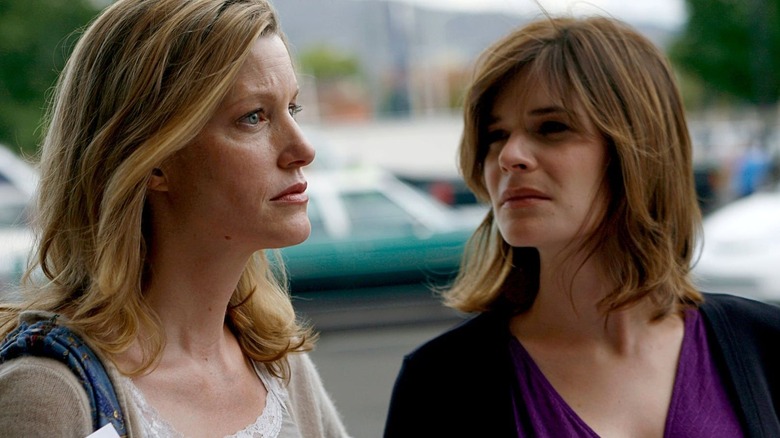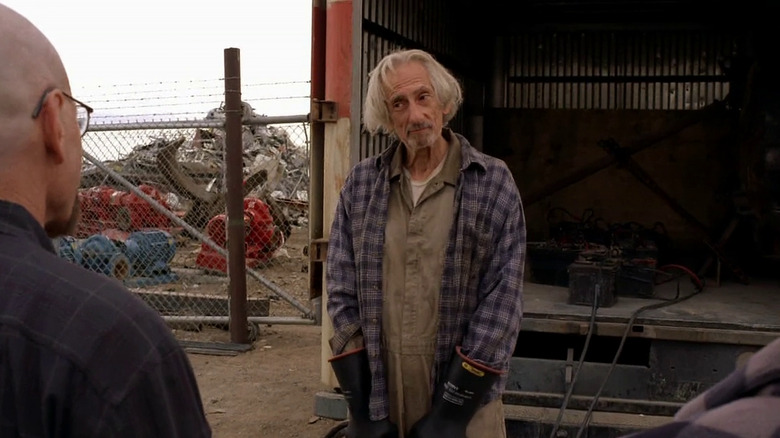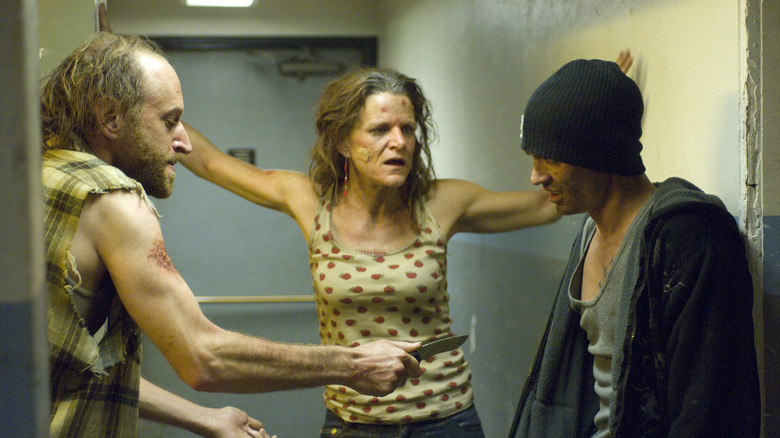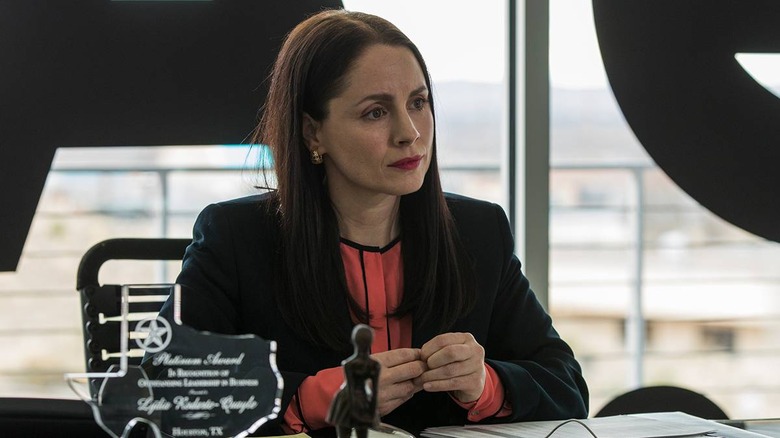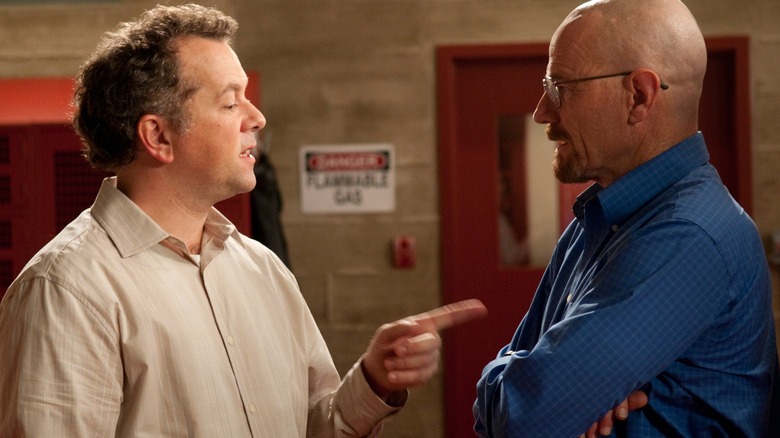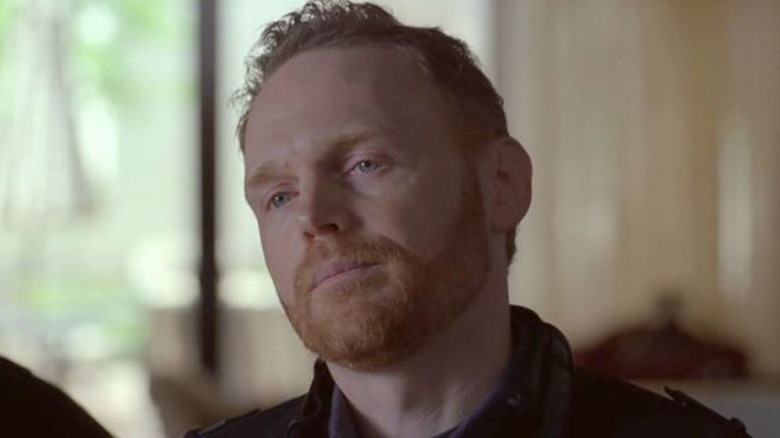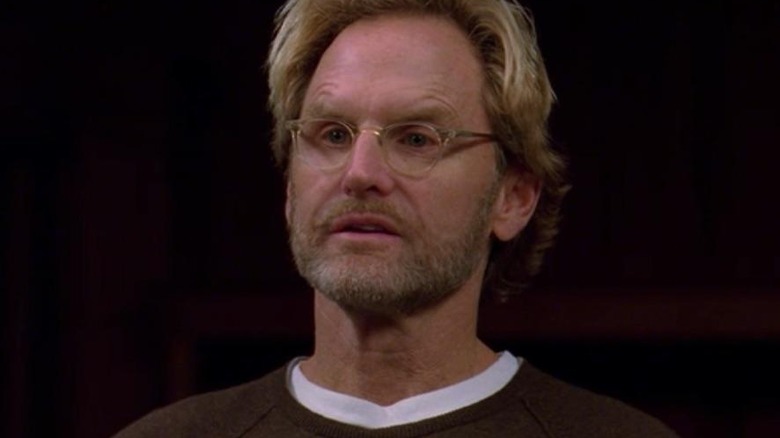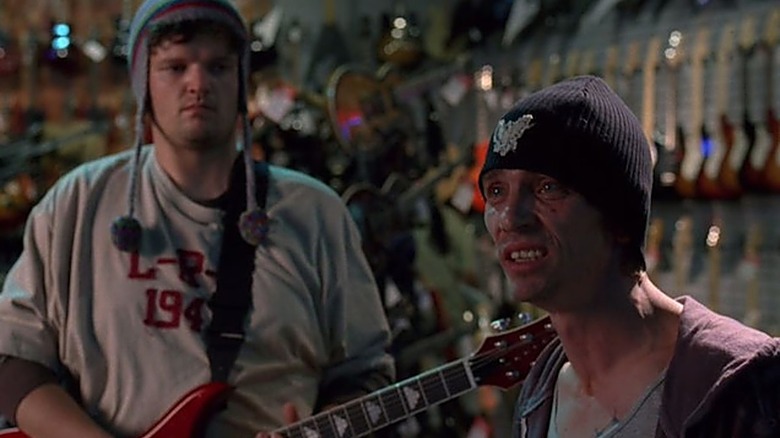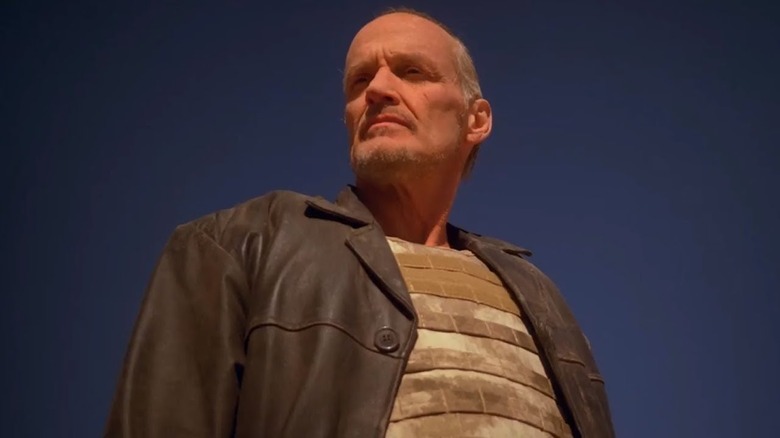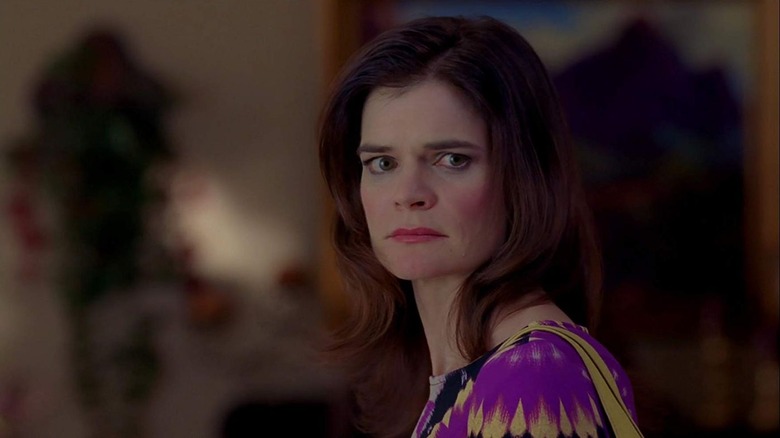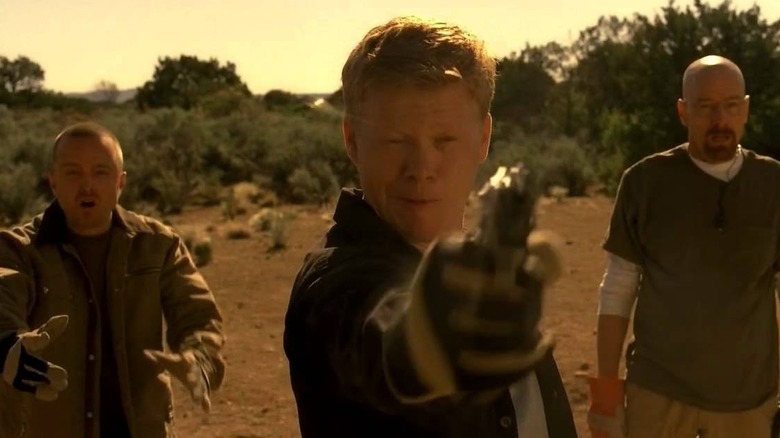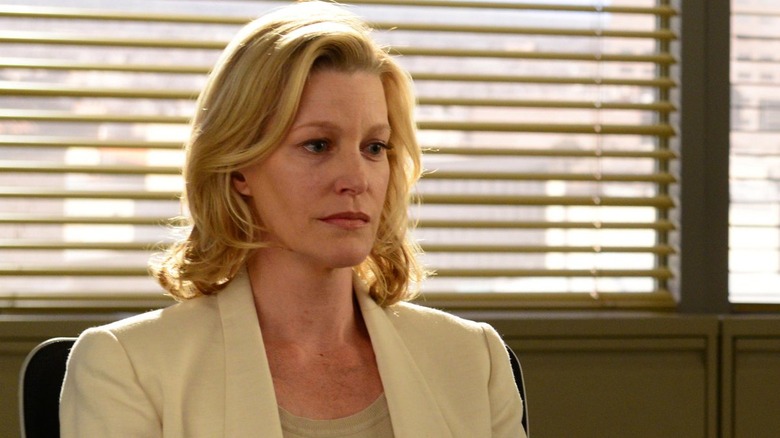The Most Underrated Breaking Bad Characters
It's been said a million times (including pretty often by us) that "Breaking Bad" is one of the greatest shows ever made. Across five seasons and 62 episodes, the story of Walter White's moral descent from a mild-mannered high school teacher and family man to a ruthless drug lord made no serious narrative missteps. It started strong with an excellent pilot episode and never lost its footing or momentum on its way to a crowd-pleasing, thoroughly satisfying finale that tied up all the loose ends. Along the way, we got more than our fair share of top-of-the-line writing, direction, editing, music, cinematography, and acting.
We also got some of TV history's most iconic and beloved characters. Reams have been written about the main man himself, of course — Heisenberg is undeniably one of the greatest fictional characters of all time. But plenty of praise has been deservedly heaped on Jesse, too, as well as Gus, Mike, Hank, and Saul. In fact, the latter was so popular he got his own spin-off series, which is every bit as masterfully crafted as the original show.
But what about everyone else? "Breaking Bad" didn't have as large of an ensemble cast as some other prestige TV dramas did, but there were still plenty of people outside the main roster who often get overlooked by fans or, in some regrettable cases, unfairly disliked. So which "Breaking Bad" characters deserve a little more love from fans? We've assembled a list of them here. WARNING: SPOILERS AHEAD.
Old Joe
You could argue that a focal point of "Breaking Bad" is how there's more to many people than meets the eye. That's obviously one of the central themes of Walt's story, but it can be applied to Jesse, Gus, and even Skinny Pete, who's a washed-up vagrant who can play a mean piano. Then there's Old Joe — a homeless-looking old man who runs a local junkyard and will dispose of any incriminating vehicle or let you use his equipment for clandestine activities without asking, as long as you pay a handsome sum.
Despite looking like a street urchin who's been electrocuted, Old Joe is surprisingly brilliant, quick on his wit, level-headed, and well-read. When Hank follows Jesse to the junkyard where the RV is being kept, it's Old Joe who comes to the rescue. He tells Hank that the RV is technically a domicile and thus can't be searched without a warrant, even though Hank knows Jesse is in there and has been using the vehicle — er, domicile — for illicit reasons. Joe effortlessly parries Hank's legal arguments and buys time for Walt — who's also trapped inside — to concoct a disturbingly brilliant plan to lure Hank away with a fake call about Marie being in a car accident. Later on, Walt, Jesse, and Mike revisit Old Joe, who helps them hook a giant magnet up to batteries in the back of one of his trucks so they can destroy incriminating evidence in a police station.
Spooge and Skank
They might've only shown up for two episodes — Season 2's "Breakage" and "Peekaboo" — but these two loathsome meth fiends, played brilliantly (and hauntingly) by David Ury and Dale Dickey, are far too maniacally twisted and entertaining to not warrant a mention on this list. In "Breakage," a montage of Jesse's idiot buddies selling meth ends when Skinny Pete is held up at knife-point and robbed of his stash by this husband-and-wife meth addict duo. Walt is furious at this and convinces Jesse, the chief distributor, to "handle things." Jesse, who's simply not an intimidating person, manages to gather enough courage to break into their dump of a house (where their adorable, neglected little kid lives in squalor).
When the two parents get there, he struggles to control them and keep them focused as he demands, at gunpoint, that they pay him back or return the stolen drugs. Eventually, he gets the funds he needs out of an ATM that they'd stolen, but not before "Skank" — the name Spooge frequently gives to his unofficially unnamed wife, much to her irritation — drops the machine on her husband's head for insulting her and proceeds to get high and pass out. Jesse literally takes the money and runs after calling the police so the little toddler in the house can be saved. The story of Spooge and "Skank" is a tragic one, to be sure, but everything in "Breaking Bad" is tragic, and that certainly doesn't disqualify them from this list.
Lydia Rodarte-Quayle
Can you still be considered paranoid if everyone really is out to get you? We're not sure. But we do know that Lydia Rodarte-Quayle, Madrigal Electromotive's uptight, joylessly nervous U.S. logistical executive — played stellarly by Laura Fraser — didn't quite seem to fit into the violent drug world she'd inserted herself into. In fact, she seems even more out of place there than Walt and Gus. Walt's pride and resentment helped him adapt quite well to the ruthlessness of the trade, at least eventually, and Gus' normalcy was never more than a carefully crafted facade to begin with. But Lydia seems like she was the kind of kid who'd remind the teacher about homework or rat you out for going to the bathroom without a hall pass. How she wound up in a world of drugs, corruption, and murder — and even became a driving force behind much of the show's violence in the final episodes — is anyone's guess. But we're guessing it had more than a little to do with money. Join the club.
All we know is that she's a much more cunning and dangerous force than her panicky, nail-biting nervousness would seem to suggest. She's ambitious, having facilitated massive international expansions of the blue meth trade. She's persuasive, as evidenced by the fact that she frequently convinces people to join her plans (and spare her life), and she has no problem having loose ends taken care of. Point is, she's easy to underestimate — until it's too late.
Gale Boetticher
Gale Boetticher, a highly-educated meth cook who briefly supports Walt in Gus Fring's super lab, is easily one of the strangest characters on the show. In no way does this goofy dork fit in with all these bloodthirsty, drug-dealing gangsters. He prides himself on coffee, poetry, his plants, and making silly videos of himself dancing. When Gale finds out he's been replaced by Jesse Pinkman — a low-class, immature drug addict — he says, "This makes no sense." Well, based on all this, it does make sense. Sorry, Gale, but you're a sweetheart in a world of sharks.
Gale's impact exceeded what his limited screen time would suggest. Gus was grooming Gale to replace Walt, but Walt and Jesse got to him first, shooting the poor man in his apartment at the end of Season 3 and forcing Fring to keep them on the payroll. It was a huge turning point in both the duo's relationship with Gus and a major development in Hank's Heisenberg case — arguably the two most important arcs of Season 4. In one underappreciated scene, Hank, who believes Gale was Heisenberg, mocks his nerdiness. Walt, slightly drunk and unwilling to let someone else takes credit for his meth formula, scoffs at the notion and convinces Hank that Heisenberg is still out there. Then, of course, Gale's letter to Walt is what finally tips Hank off to his brother-in-law's dark secret. We can thank Gale, played brilliantly by David Costabile, for all of these major, game-changing moments.
Patrick Kuby
Whereas the gigantic, lovable teddy bear Huell Babineaux has become something of a fan-favorite meme at this point, his partner Patrick Kuby rarely gets the love or attention he deserves. And that's a shame, because Saul Goodman's red-headed enforcer is played with all the comedic sensibilities you'd expect out of Bill Burr and is arguably more important to the story and the success of the protagonists than Huell is. He's the guy who convinced Bogdan to sell the car wash to Skyler and Walt at a reduced price by falsely convincing him it was producing polluted runoff water that violated local ordinances and would have to shut down for months. He was the guy who took the lead in getting Ted Beneke to finally pay off the IRS (although Huell also played an important role, simply by being an intimidating presence). Crucially, in Season 5, Kuby anchored Walt, Jesse, Todd, and Mike's train heist plan by killing his truck on the tracks and distracting the conductors while they helped him fix it. In the background, thanks to his quick thinking, the protagonists (can't really call them "heroes" for obvious reasons) successfully stole record-breaking amounts of methylamine. A few episodes later, Kuby and Huell move Walt's money to the desert to hide it from Hank.
Time and again, this sharp-witted, dependable conman played a crucial role in the plans of the main characters, which would've failed otherwise. Hopefully, he joins Huell with an appearance on "Better Call Saul" before it's too late.
Group Leader
In Season 3, Jesse, devastated by Jane Margolis' death, ends up in a group therapy/rehab program for recovering addicts that's led by the unnamed "Group Leader," played by Jere Burns. Jesse's role in the group shifts somewhat over time. At first, he's skeptical. Later, he sees a business opportunity and begins discretely selling meth to the other vulnerable attendees. However, by Season 4, Jesse realizes he simply can't be the villain and confesses to killing a "dog" in cold blood (a reference to Gale Boetticher, who he'd murdered at the end of Season 3).
Throughout it all, Burns' character, while clueless as to what's really going on with Jesse, anchors the group with calm, steadfast wisdom informed by his own troubled past as an addict. According to him, growth is impossible without self-acceptance — a lesson he learned the hard way after his addiction led to the accidental death of his own daughter and the resulting guilt sent him spiraling. In one of the show's most powerful scenes, the Leader — who had thus far refused to condemn his members for their actions, believing guilt to be a barrier to progress — finally puts his foot down when a tearful Jesse admits to having exploited the group to sell meth.
No one familiar with Burns' filmography should be surprised that he's excellent in the role. Beyond that, his character introduces an important thematic question: Is there a moral point of no return that even remorse can't save you from?
If you or anyone you know is struggling with addiction issues, help is available. Visit the Substance Abuse and Mental Health Services Administration website or contact SAMHSA's National Helpline at 1-800-662-HELP (4357).
Badger & Skinny Pete
No "Breaking Bad" character goes through as much trauma and tragedy as Jesse Pinkman. His friend Combo and both of his on-screen girlfriends die. The son of one of his girlfriends is poisoned and briefly hospitalized by Walt. He's thrown out of his house by estranged parents who can't trust him after enduring years of drug abuse and manipulation. He's constantly being beaten up and shot at, and at the end of the series, he's enslaved as a meth cook by white supremacists for the better part of a year. And that's not even an exhaustive list.
Luckily, through it all, he's always got dependable buddies Badger and Skinny Pete by his side. They're not even a little bit smart, nor are they particularly helpful in most circumstances (although they certainly lend a hand every now and then, usually helping Jesse sell drugs). But they never think of emotionally abandoning their pal, even though they're usually pawns in his schemes at the very best and little more than afterthoughts at the worst. On top of that, they're hilarious, and their banter with Jesse or each other often serves as much-needed comic relief. They even help Walt get money to his family and house Jesse after his escape, as seen in "El Camino." We can't say they're the kind of friends we'd want since they're hopelessly stupid, but the loyalty and companionship they gave Jesse is undeniable.
Jack Welker
Ask any "Breaking Bad" fan to name the most important characters, and you'll get Walt, Jesse, Hank, Saul, Gus, Skyler, Mike, and maybe one or two others. But for some reason, Jack Welker, the neo-Nazi gangster who serves as the show's principal antagonist in its final episodes, never makes the cut. Isn't that weird? After all, the man helped Walt deal with the imprisoned, Gus Fring-era enforcers that Hank was trying to flip in his Heisenberg case. Then he ended the case directly by killing Hank and Steve Gomez before imprisoning Jesse as a meth-cooking slave for roughly a year. Afterward, he had his goons break into both the White's family home to scare Skyler into silence and Hank and Marie's to steal the confession tape Jesse made to take down Walt, which also incriminated Jack's nephew Todd.
That's a lot. But the point is, the man was not a minor, incidental character. Say what you will about how corny it was for a show like this to default to "Nazis" as its final round of Big Bads — presumably because no other category of villain was contemptible enough to make you sympathize with a monster like Walt. But it's undeniable that Jack Welker had a massive role to play in the show's final stretch. His death scene is one of the most satisfying on the entire show, and we think actor Michael Bowen deserves to be listed with pride among the show's rightfully praised ensemble cast.
Marie Schrader
Marie Schrader is nobody's favorite character, but she's been seriously mistreated by fans. Many hate her because she's a kleptomaniac. But this is a show about murderous drug kingpins, so her stealing some spoons from an open house (which, of course, we're not condoning) wouldn't even make the list of the top 100 most evil things "Breaking Bad" characters have done. People also hate her because she's shrill and naggy, but that's a lazy and sexist observation. While Marie can certainly be a bit much, so can her husband. Remember how obnoxious Hank was in Season 1 before he was replaced as the show's comic relief by Saul Goodman and his dramatic potential started to be expanded? He was a fratboy, so let's cut his wife some slack.
Speaking of Hank, we can say this: Marie is a fantastic wife. She supported Hank's career aspirations, his decision not to return to El Paso, and his hunting of Walt. When he's nearly killed by "The Cousins," it's Marie's fierce loyalty and refusal to give up on him that saves him from being wheelchair-bound for the rest of his life. And let's not forget, he mistreated and verbally abused her throughout his entire recovery. On top of that, she's an excellent aunt, always happy to take Walt Jr. and Holly in when Walt and Skyler are having marital troubles. And of course, we have to mention Betsy Brandt's fantastic, underappreciated performance throughout the show. Let's give Marie some love, folks.
Todd Alquist
"Breaking Bad" has no shortage of timeless TV villains. Gustavo Fring is one for the ages: a ruthless, stone-faced criminal who's as good at running a drug empire with an iron fist as he is at pretending to be the last person on Earth who'd ever do such a thing. Tuco Salamanca and his twin cousins are terrifying. Walt himself is certainly a villain by the end, although he's never the antagonist of his own story. We could go on.
But there's one baddie who's arguably more chilling than anyone else, specifically because of how normal he appears on the surface. Whereas Gus can flip a switch and become a cold-blooded killer on a dime, Todd Alquist, played by the always solid Jesse Plemons, seems like a mild-mannered, somewhat innocent kid even when he's in the middle of murdering a child. For him, the facade of normalcy isn't a facade at all like it is for the other big players in the drug trade — he really does think this is all perfectly normal. And that psychopathic, almost innocent indifference to the feelings and needs of others is chilling stuff indeed. He'll kill your loved ones in front of you and be genuinely confused as to why you're upset. He thought you two were buddies! You know it's just business, right? What's the problem? Well, he may operate like a poorly programmed robot, but his death scene at the hands of Jesse Pinkman had us cheering on our feet.
Skyler White
Far and away, the most unfairly treated character on the show and perhaps all of recent TV history is Skyler White. Many fans felt Walt's long-suffering wife was naggy and insufficiently loyal to her — let us check our notes here — ruthless, meth-cooking, murderous, criminal kingpin of a husband. Then, when she turned a corner and started supporting his, ahem, side business, the same fans condemned her for hypocrisy and criminal behavior.
Well, we can't condone a lot of what Skyler does, like her aiding and abetting Walt's lies and laundering his money, cooking Ted Beneke's books, and then sleeping with the guy. But this is "Breaking Bad," isn't it? It'd be more than a little strange to reserve our harshest moral condemnation for Skyler and not the endless parade of morally bankrupt characters we meet over the course of the show.
Some things we can condone are Skyler's fierce loyalty to her family and the fact that a lot of her decisions make perfect sense, especially in the early seasons. After all, why should we expect her to not question Walt's increasingly untenable alibis and strange absences? And we can be impressed by her surprising craftiness later in the show, even if she's not putting it to morally good use. Lastly, we can praise Anna Gunn's stellar, multiple Emmy award-winning knockout performance throughout the show's five-season run. In a series defined by some of the greatest acting in TV history, hers more than holds its own.
